
In today’s fast-paced business environment, managing knowledge effectively is crucial for maintaining a competitive edge. However, traditional knowledge management systems often fall short in meeting the dynamic needs of modern organizations. This is where AI-powered knowledge management tools come into play, offering innovative solutions to streamline information handling and enhance decision-making processes.
Knowledge Management Business Challenges
In the ever-evolving business landscape, organizations face numerous challenges in managing their knowledge assets. Traditional systems often struggle with the following:
- Data Overload: The sheer volume of information can be overwhelming, making it difficult to find relevant data quickly.
- Information Silos: Disparate systems and departments can lead to fragmented knowledge, hindering collaboration.
- Manual Processes: Time-consuming manual data entry and retrieval processes can lead to inefficiencies and errors.
The repercussions of poor knowledge management are significant and can have several negative impacts. Lost productivity is a major consequence, as employees spend excessive time searching for information, which reduces overall efficiency. Additionally, the inability to access timely and accurate information can result in missed business opportunities, hindering growth and success. Furthermore, discrepancies in data can lead to inconsistent decision-making and erode trust in the system.
Solution: AI Knowledge Management Tools
AI-powered knowledge management tools address these challenges by:
Automating Data Handling:
Reduction in manual tasks is achieved by automating repetitive and time-consuming tasks, allowing employees to focus on more strategic activities. Streamlined data organization is facilitated by categorizing and indexing data automatically, ensuring that information is organized in a logical and easily accessible manner. Efficient data retrieval is enhanced with automation, making the process of retrieving relevant data quicker and more accurate, thereby reducing the time spent searching for information.
Breaking Down Silos:
AI-powered tools can integrate various disparate systems, such as CRM, ERP, and document management systems, into a cohesive knowledge base. By consolidating information from different sources, these tools eliminate information silos, making it easier for employees to access and share knowledge. With a unified knowledge base, teams can collaborate more effectively, as they have access to the same up-to-date information.
Enhancing Search and Analytics:
Advanced search algorithms utilize sophisticated search techniques that understand context and semantics, providing more relevant search results. Enhanced search capabilities enable users to find the information they need rapidly, improving productivity. AI-powered analytics offer insights into data usage patterns, helping organizations understand how information is being used and identify areas for improvement. Some tools can even predict future trends and information needs, allowing organizations to proactively manage their knowledge resources.
What Features Should You Look for in AI Knowledge Management Tools?
When selecting an AI knowledge management tool, consider the following features:
- Advanced Search Capabilities: Look for tools that offer semantic search and natural language processing.
- Integration with Existing Systems: Ensure the tool can seamlessly integrate with your current software and databases.
- Scalability: Choose a solution that can grow with your business needs.
- User-Friendly Interface: The tool should be easy to use for all team members, regardless of their technical expertise.
Top 10 AI-Powered Knowledge Management Software
Here is a list of AI-powered knowledge management tools along with their best field of use:
- FuseBase: A versatile platform for managing knowledge and sharing information securely.
- ClickUp: Efficient knowledge base maintenance.
- Bit.ai: Real-time collaboration and content creation.
- OneBar: Centralizing knowledge using a Q&A-style approach.
- Confluence: Organizational knowledge centralization and project management.
- Process Street: Process management focusing on compliance and quality control.
- Tettra: Knowledge sharing and onboarding.
- Document360: Building knowledge bases for internal teams and customer support.
- Capacity: Keeping information tidy and accessible.
- Notion: Customizable workspaces and workflow sharing.
This guide narrows down the extensive range of knowledge management tools to showcase our top recommendations. Below, you’ll find our selected AI-driven knowledge management tools.
1. FuseBase
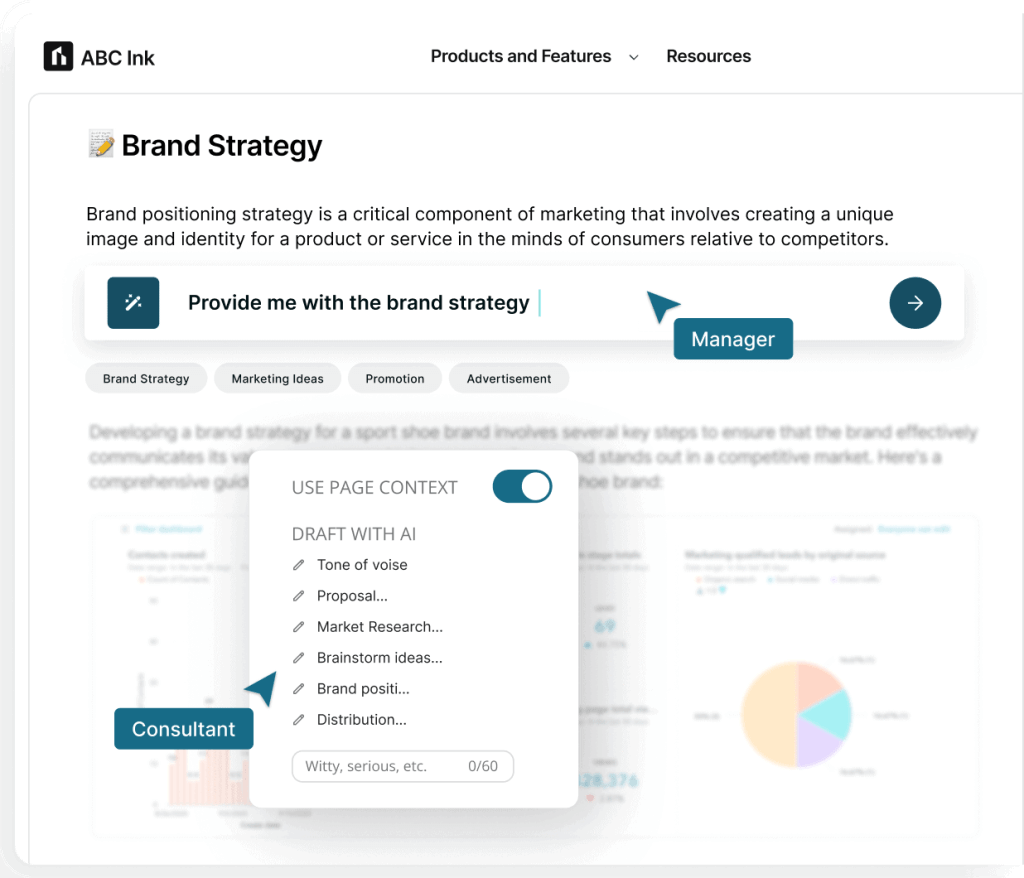
FuseBase AI Helper is an all-in-one tool designed to improve knowledge management processes. It simplifies documentation, transcribes important meetings, and organizes data, making it easier to make informed business decisions. Whether you’re a startup, SMB, or large enterprise, FuseBase AI can streamline your content creation and management tasks.
Imagine that your marketing team holds a weekly meeting to discuss campaign results. By uploading the recordings of these meetings to FuseBase, you can get detailed transcripts. Artificial intelligence will highlight the key points of the discussion and suggest improvements. This makes it easier to track progress, identify successful strategies, and implement changes quickly, ensuring that your marketing efforts are always optimized.
- Startups can use FuseBase to easily manage documents and create high-quality content with AI-powered suggestions. Detailed permissions allow you to control who can view, edit, and share documents, ensuring that confidential information remains secure.
- Small and medium-sized businesses benefit from intelligent search and secure data processing. Video recordings of meetings can be uploaded to transcribe text, making it easier to analyze and extract key points.
- Larger enterprises can use advanced analytics and customizable features to organize data and gain business insights. The platform scales efficiently to handle large volumes of data and facilitates seamless data sharing with customers or partners.
FuseBase offers a wide range of features and customization options that may take some time to perfectly match your needs. The support team is always ready to help you customize these features to meet your business requirements.
2. ClickUp
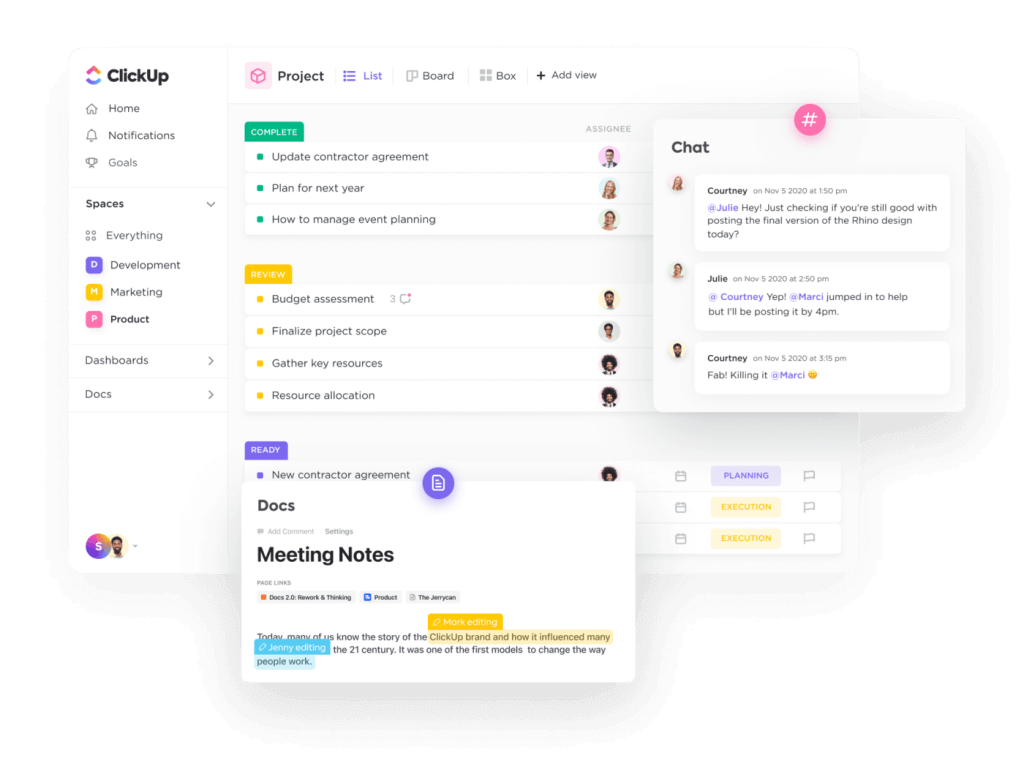
ClickUp AI simplifies content creation, summarizes documents, and organizes information, making it easier to maintain an efficient and comprehensive knowledge base. With ClickUp Brain, you can improve your writing using advanced artificial intelligence knowledge and machine learning tools.
With ClickUp AI, you can quickly summarize market research documents, generate actionable to-do lists based on brainstorming sessions, and create a well-organized knowledge base for a project.
- You can easily start your projects using their templates designed to help you quickly set up your knowledge base.
- ClickUp allows you to organize documents using categories and tags. Personalization options provide extensive personalization and customization options, including colors and categories.
- The actionable notes feature helps turn ordinary notes into action items, making project and task management more efficient.
ClickUp AI is only available in paid plans, which can be a limitation for companies looking for free solutions.
3. Bit.ai
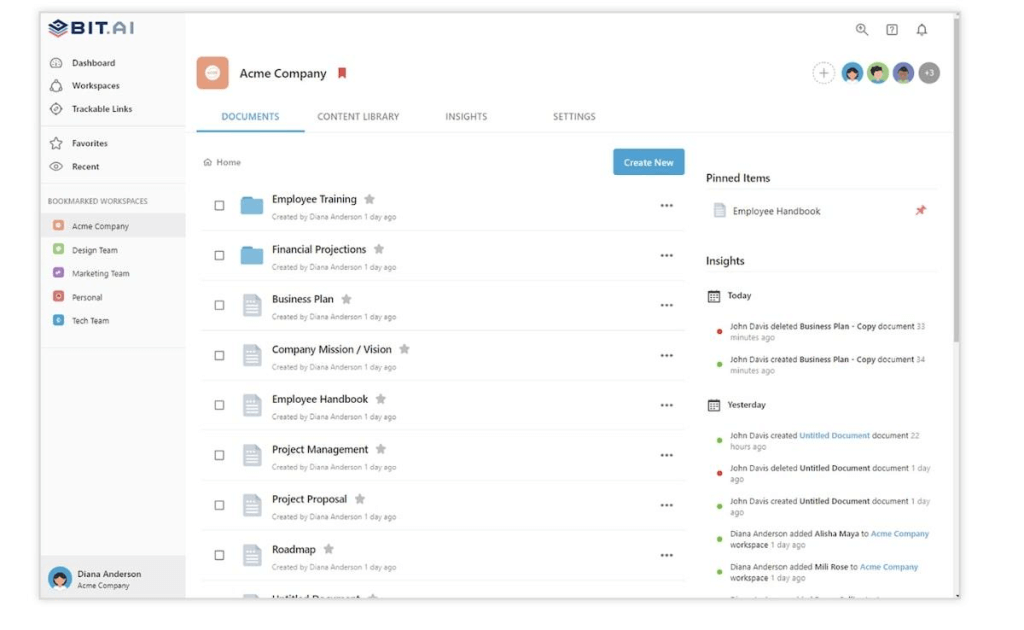
Bit.ai is a versatile AI-based tool designed to enhance knowledge management processes for businesses of all sizes. It simplifies content creation, summarizes documents, and organizes information, making it easier for teams to collaborate and manage their knowledge bases, wikis, training guides, and client portals. With its AI capabilities and real-time collaboration features, Bit.ai aims to streamline productivity and improve information management
By using Bit.ai, team members can collaborate in real-time on the project documentation. The AI Genius feature can assist in drafting and refining content, ensuring that all necessary information is captured accurately and efficiently.
- Bit.ai offers a range of features for startups including AI-powered content suggestions, real-time collaboration, and seamless file sharing with shareable and trackable links.
- Additionally, the platform enhances data security and improves overall operational efficiency.
- Bit.ai is designed to scale with your business, streamline repetitive tasks with automation features that save time and reduce manual effort.
The user experience could be improved with a better UI, as noted by some users. While Bit.ai offers a free plan, advanced features and functionalities are available only in the paid plans.
4. OneBar
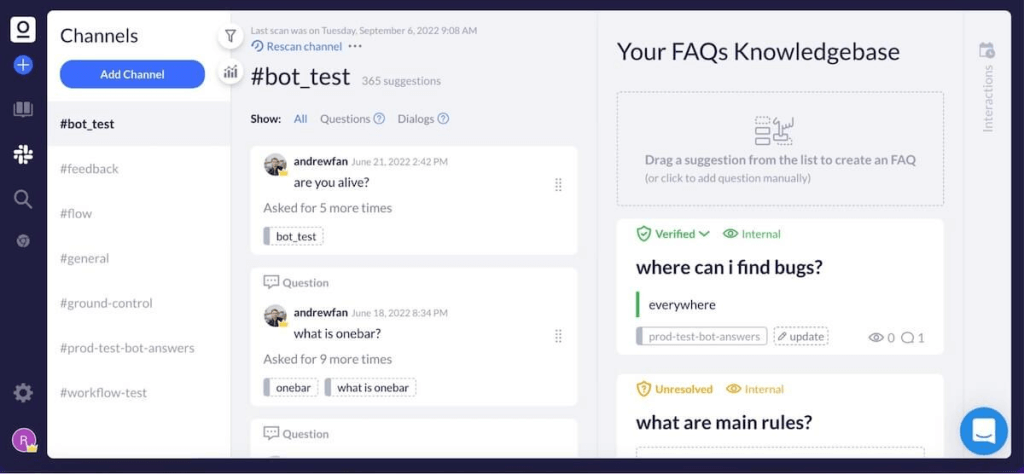
OneBar is a dedicated knowledge management platform designed to centralize and streamline information for organizations of all sizes. By adopting a Q&A-style approach, OneBar allows users to ask questions and receive answers from an AI bot, with contributions from team members. This method enhances the capture and sharing of organizational knowledge, making it easier for businesses to access and utilize their data and information effectively.
- If your team uses Slack, OneBar can be seamlessly integrated to capture and manage knowledge directly within your workflow. When a new team member joins, they can quickly search for answers within OneBar, reducing onboarding time and ensuring consistent responses to customers.
- Startups can leverage OneBar to manage communication and documents to generate content through AI-powered suggestions.
- The platform scales efficiently to manage large volumes of data and documentation, supporting complex organizational needs.
OneBar is designed to be used with Slack, which may limit its value for organizations not using this app. Access to OneBar’s full range of features is available only through paid plans, which may be a consideration for budget-conscious businesses.
5. Confluence
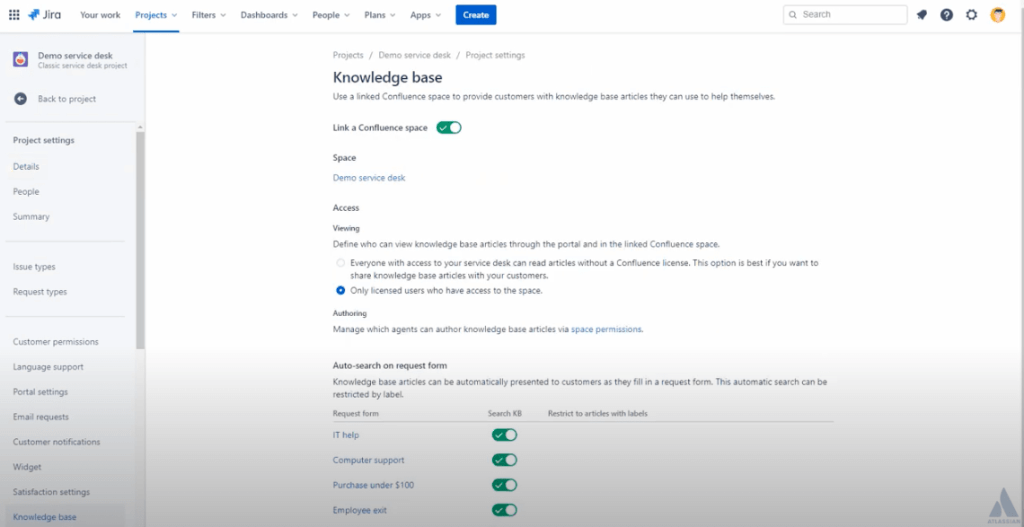
Confluence centralizes organizational knowledge, making it easier for teams to access, create, and manage content. With features like AI-powered writing assistance, document summarization, and intelligent information organization, this tool simplifies content creation and improves overall productivity.
A mid-sized marketing agency can use the tool to collaboratively brainstorm campaign ideas, document strategies, and keep track of project progress. The AI-powered search helps quickly locate previous campaign data, ensuring the team can build on past successes without reinventing the wheel.
- Startups can quickly condense lengthy reports and documents, saving time and improving comprehension.
- Confluence focuses on dedicated spaces for different projects or departments, making information retrieval straightforward.
- Adapts to the growing needs of large organizations, supporting extensive documentation and multiple user roles.
Some users have reported that the search functionality could be improved for better accuracy and relevance. Changing permission levels for different pages can be confusing and may require additional training.
6. Process Street
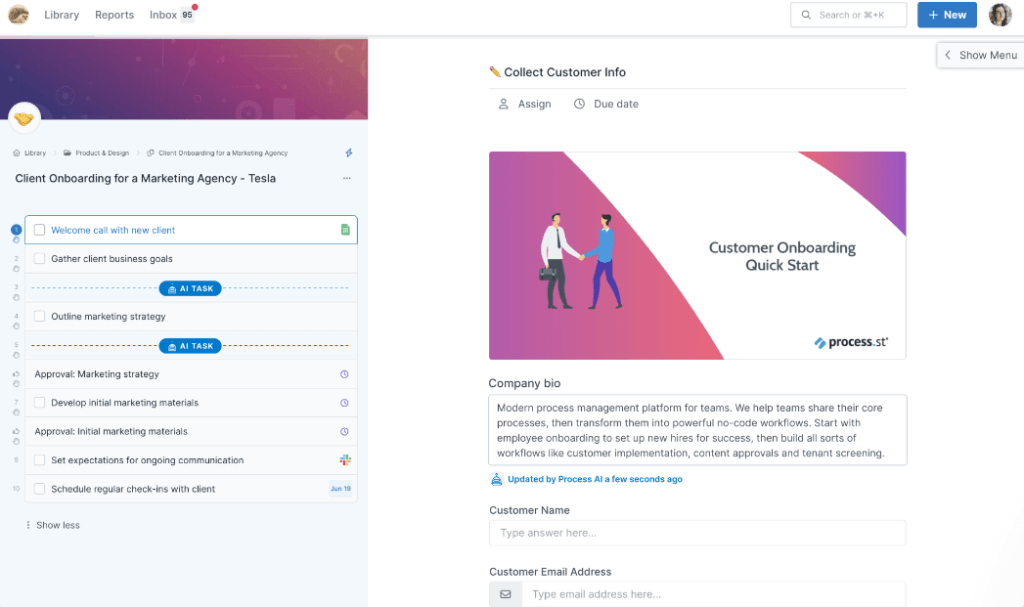
Process Street is an AI-powered knowledge management system designed to streamline and enhance process management for businesses of all sizes. Its primary use case is to help teams focus on compliance and quality control by providing tools to capture, organize, and share standard operating procedures (SOPs). The platform ensures transparency and efficient process management, making it an essential tool for maintaining compliance.
- Process Street helps startups by providing a simple and efficient platform to create, manage, and automate workflows and standard operating procedures (SOPs).
- A mid-sized marketing agency can use Process Street to document its client onboarding process. By setting permission levels, only senior managers can edit the SOPs, while junior staff can view and follow the procedures, ensuring consistency and quality control.
- Seamlessly connect with other enterprise systems to create a unified workflow.
The tool is only available in paid plans, which may be prohibitive for some users, especially small businesses or new agencies.
7. Tettra
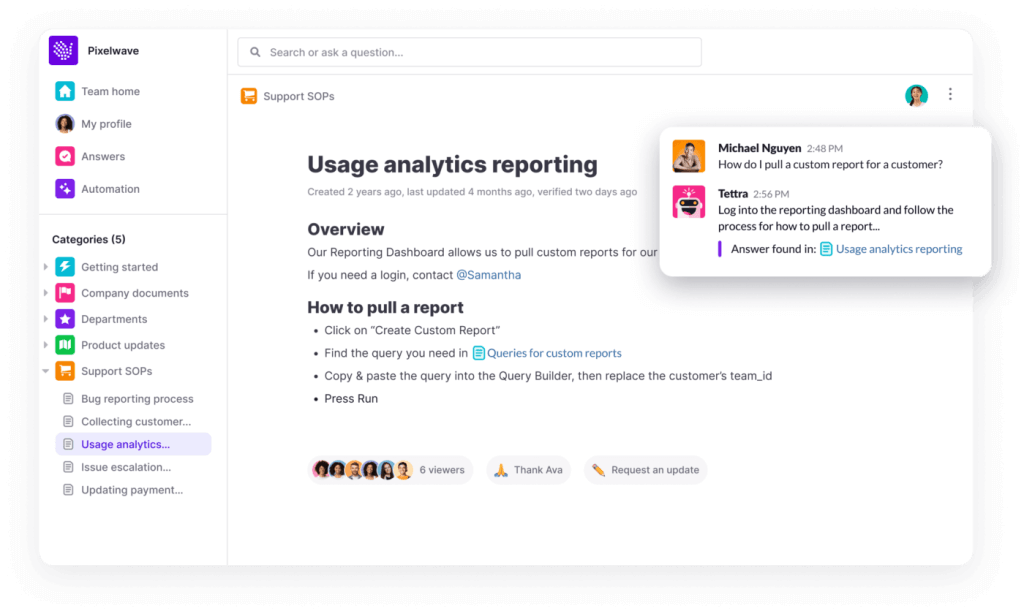
Tettra is an AI-powered knowledge sharing software designed to enhance knowledge management processes for businesses of all sizes. It helps speed up the onboarding process and keeps team members informed by storing and curating relevant information, ensuring it surfaces at the right moment.
To maximize the benefits of Tettra, integrate it with your existing communication tools like Slack. By storing all onboarding documents and FAQs in Tettra, new team members could quickly find the information they needed.
- Quickly create new content or import existing content from Google Drive or Notion to build a comprehensive knowledge base.
- Tettra helps small to mid-sized businesses by identifying and addressing knowledge gaps, and efficiently organizing information to prevent duplication and ensure easy access.
- Enhance collaboration across departments by providing a centralized knowledge base that everyone can access and contribute to.
Users report that you can’t list a piece of content in two places without creating a copy, leading to unnecessary duplication.
8. Document360
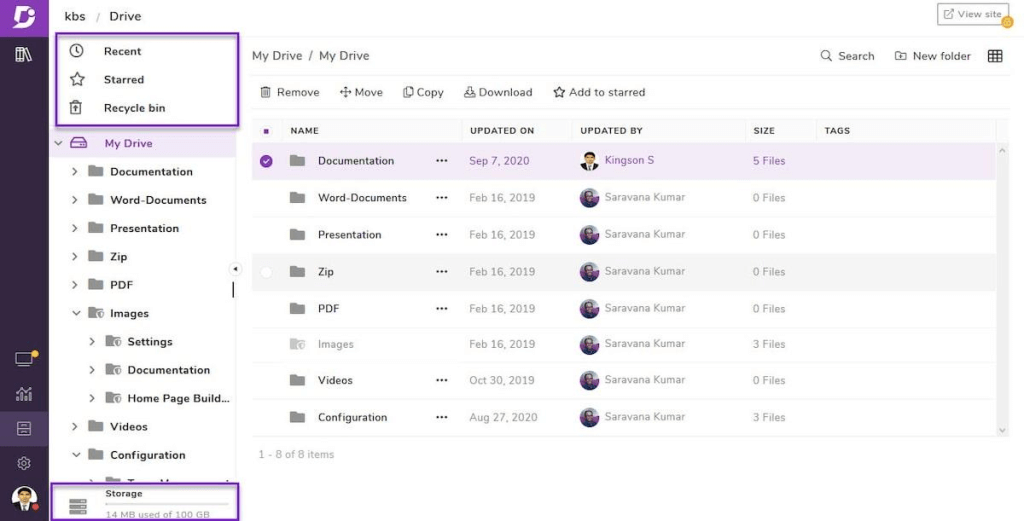
Document360 is a versatile AI tool designed to enhance knowledge management processes for businesses of all sizes. It allows teams to build comprehensive knowledge bases, manuals, SOPs, or wikis, ensuring that all content is centralized and easily accessible. This tool is particularly beneficial for internal teams and customer support, facilitating efficient knowledge and learning management.
Leverage Document360‘s business glossary feature to define and standardize frequently used terms within your organization. This ensures consistency and clarity in communication across all departments.
- Simplify content creation by using AI to summarize lengthy documents, making it easier for teams to digest information quickly.
- A mid-sized tech company can use the business glossary to define technical jargon and acronyms used in product development.
- Document360 offers scalable solutions that can accommodate the growing needs of large enterprises, including advanced customization options.
Analytics are only available for the last 30 days by default, which may not be sufficient for long-term performance tracking.
9. Capacity
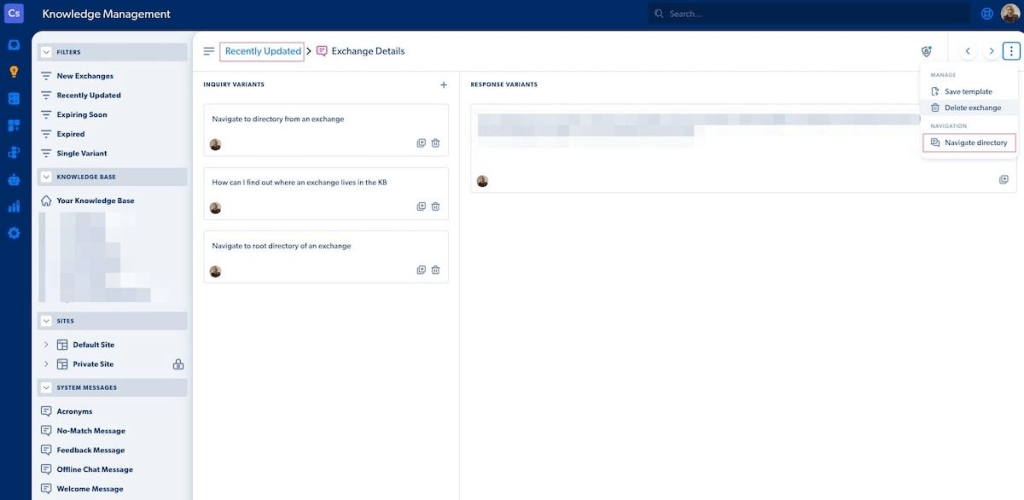
Capacity is an AI-powered platform designed to enhance knowledge management processes for businesses of all sizes. Its primary use case is to keep information tidy and easily accessible for both internal team members and customers.
To maximize the benefits of Capacity, integrate it with your existing communication and project management tools. This will streamline the flow of information and ensure that your team can access the knowledge base seamlessly.
- Use folders, dialogs, and exchanges to keep information structured and easily navigable.
- Quickly summarize lengthy documents to extract key points, saving time and improving productivity.
- Set complex user permissions based on department, location, and more to manage large teams effectively.
There can be a learning curve as team members get accustomed to the new system, which may require additional training and support.
10. Notion

Notion is a versatile solution designed to enhance knowledge management processes with customizable workspaces. This tool simplifies content creation, summarizes documents, and organizes information, making it an invaluable asset for improving productivity and streamlining workflows.
While the tool has limitations, it can still be used to manage access to different sections of the knowledge base. To maximize the benefits of this AI tool, integrate it into your daily workflow by using it to automate routine tasks such as data entry and document summarization.
- A small marketing agency can use the AI tool to automatically generate weekly reports from raw data, saving hours of manual work and allowing the team to focus on strategy and client engagement.
- Create and maintain an internal wiki to ensure that all employees have access to up-to-date information.
- The AI features are only available in paid plans, which may be a consideration for budget-conscious businesses.
It’s not possible to configure user permissions to data subsets, which may impact data organization within a company wiki.
Summary
For teams aiming to build a company wiki or internal knowledge base, numerous AI-powered tools are available for you to sign up and use. Here are some tips tailored to different business sizes:
Startups:
Opt for budget-friendly solutions that provide essential features without breaking the bank. This ensures you get the most value for your investment.
Small to Mid-Sized Businesses (SMBs):
Choose tools that offer customizability to meet your specific needs. This supports effective team collaboration and knowledge sharing.
Large Enterprises:
Ensure your tools provide enterprise-grade security to comply with industry standards for data security and privacy. Additionally, they should integrate seamlessly with complex systems like ERP and CRM.
